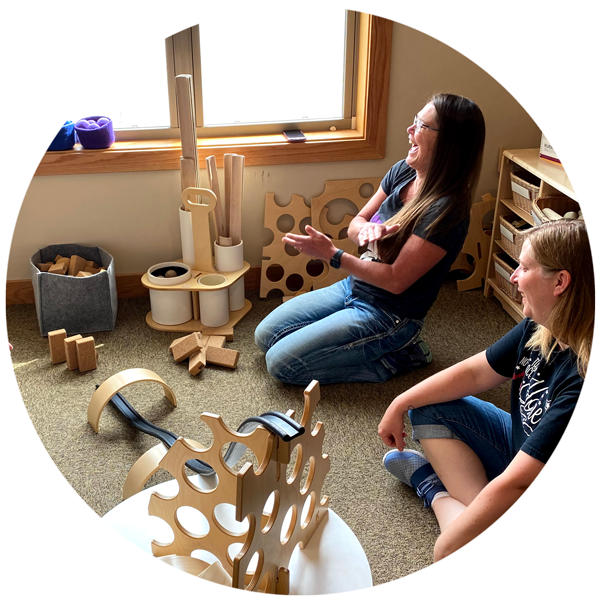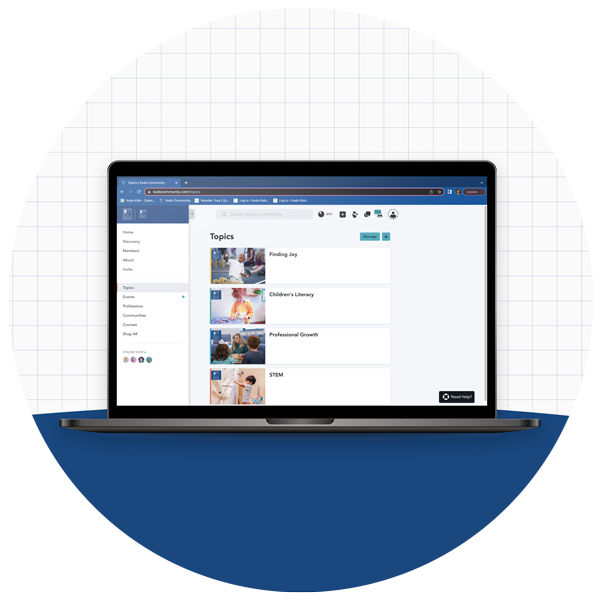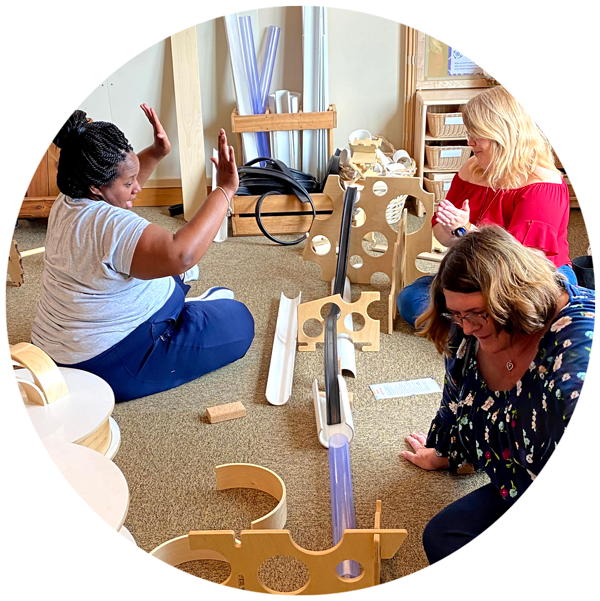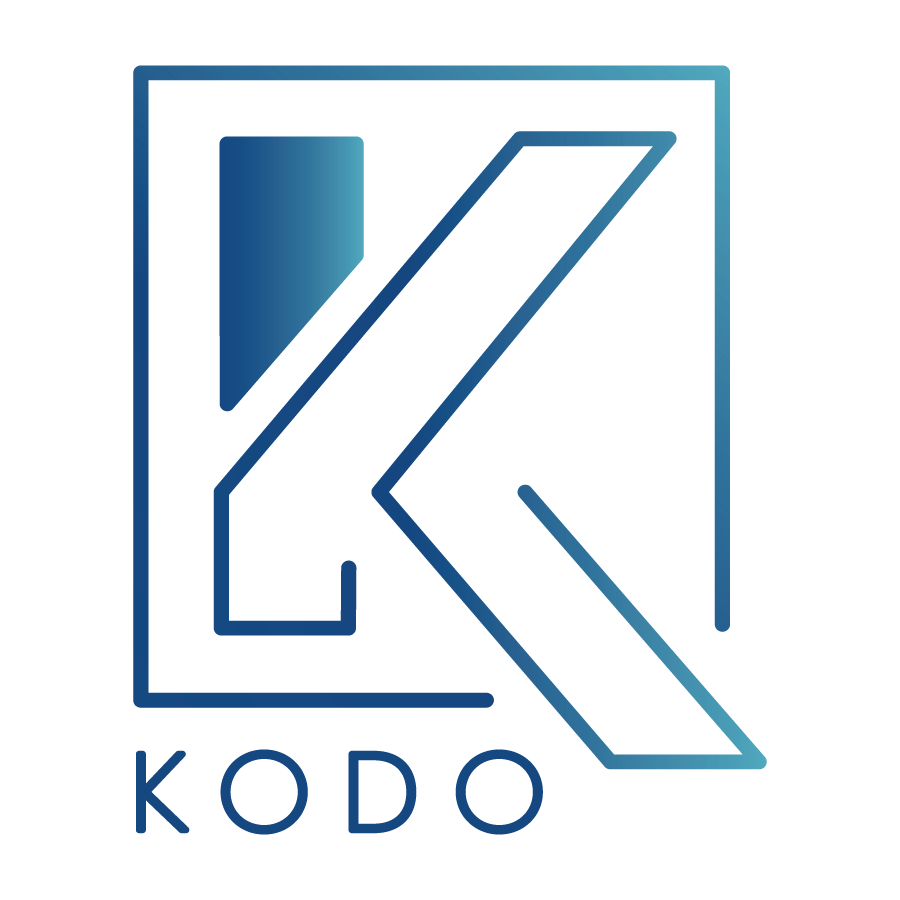Trying to access your PD Courses? Sign in to the portal here.
Professional Development
Kodo’s Professional Development program enhances our overall vision and commitment to supporting educators. Our sessions create opportunities for educators to recognize, identify, and create implementation plans for thoughtful facilitation to support children’s learning and development.
In-Person
Professional Development
Kodo’s In-Person Professional Development services include sessions and materials that inform and transform an educator’s practice by:
-
Translating theory into practice
-
Providing hands-on interactive experiences
for adult learners -
Using multimedia resources to observe
and model successful practical strategies -
Offering opportunities for professional reflection

Available Topics
Uncovering Stem Through Play
The core knowledge today’s students need is grounded in STEM subject matter. It includes
literacy, numeracy, scientific literacy, technology literacy, and cultural literacy. These subjects are
typically taught individually through direct instruction. Many higher education and industry leaders recognize that young adults entering colleges, universities, and the workforce have a core knowledge base, however, they lack the ability to “flex” their thinking. 21st-century learners
approach complex challenges and unknown situations fluidly, through critical thinking, problem solving, creativity, communication, and collaboration. They apply curiosity, initiative, persistence, adaptability, leadership, and social awareness to their changing learning and work environments.
Looking through the lens of 21st-century learning and the skills children need to succeed, we will
provide educators with an understanding of how STEM is naturally occurring in children’s
everyday play, exploration, and investigation of their world. We’ll look at how STEM domains
overlap, how children best experience STEM early on, and ways to foster a deeper level of thinking
in children’s play. Further, we will assist in the discovery of how educators can support and
enhance children’s cognitive, social, and emotional play through STEM investigations.
Through hands-on experiences with Kodo’s exclusive STEM based products and loose parts, a reflection of
their learning through play, and enhanced engagement from experienced trainers, participants
will have the knowledge and tools to uncover and incorporate STEM thinking and skills in the
classroom environment.
Objectives:
1. Have an understanding of STEM domains and how they relate to 21st-Century learners and
skills.
2. Identify different types of materials and vocabulary that relate to STEM learning and thinking.
3. Examine how STEM learning happens throughout the early childhood environment
The ‘E’ in STEM: Demystifying Engineering
Engineering happens every day in early learning environments. In this session, we will demystify engineering by clarifying what engineering is and identifying ways engineering is naturally incorporated in the industry and play of children. We will examine how providing intriguing loose parts and facilitating problem-solving using the design process are at the heart of engineering. We will introduce Kodo’s TMI Design Process to engender problem-solving skills, support children’s growing methods of communication, and introduce a framework for collaboration.
Participants will learn how to foster engineering mindset in children by focusing on process, in addition to outcomes when facilitating their play and investigations. Come tinker with materials, experience engineering first hand, and the importance of reflecting, expressing and representing both our own work and the work of children.
Objectives:
1. Identify ways engineering is naturally occurring in children’s everyday work and play.
2. Examine how providing intriguing loose parts and facilitating problem solving using the design
process are at the heart of engineering.
3. Be introduced to Kodo’s TIMI Design Process to solve problems.
4. Learn how to foster an engineering mindset by focusing on process, making keen
observations, and documenting play and investigations.
Infant and Toddler engineering
STEM in early childhood environments is often avoided simply because we are are not familiar
with the topic(s). We will clarify what STEM is and identify ways that it is already happening every day in infant toddler learning environments.
In this session, participants will learn specific strategies to broaden multisensory exploration through intriguing loose parts to foster young children’s brain development and pre-STEM behaviors; how to use the environment and materials to foster STEM through a play-based approach; and to understand and experience STEM for themselves through play, problem solving and collaboration with peers.
Objectives:
1. Recognize STEM skills that are common and happen every day in early learning environments
for infants and toddlers.
2. Clarify how the five senses are organizing principles for a child’s brain development and the
importance of providing intriguing loose parts that offer multisensory experiences to foster STEM
learning.
3. Identify concrete strategies to foster and expand sensory exploration into meaningful
investigations.
4. Learn practical environmental and adult child facilitation strategies to foster STEM thinking
and skills.
Fostering Meaningful Investigations through play and provocation
Learn how intentional investigations support mature play and children’s natural proclivity to wonder, inquire, and explore. Understand the differences between activities, explorations, and investigations and how to encourage an investigation based learning approach.
Loose Parts Play with Infants and Toddlers
Our youngest learners are exploring and learning at a rapid rate. Infants and toddlers are capable
and competent learners when provided the opportunity, space, and intentional facilitation. In this session, we will explore specific strategies to broaden multisensory exploration through intriguing loose parts to foster children’s brain development. Through hands-on exploration,
small group discussions and reflections, and observation techniques, we will use the environment as the third teacher to promote open-ended play and inquiry with our youngest learners.
Objectives:
1. Have an understanding of the learning that takes place through open-ended play.
2. Clarify how the five senses are organizing principles for a child’s brain development and the importance of providing intriguing loose parts that offer multisensory experiences to foster STEM learning.
3. Identify appropriate loose parts and materials to engage infants and toddlers in play.
4. Explore the environment, materials, and observation techniques to foster inquiry with our youngest learners.
Enhancing the environment to foster engineering
Through anecdotal stories, discussion, photographs, and practical experiential activities, we will set up and use the environment as a third teacher, present open-ended materials and loose parts to foster investigations that broaden and deepen children’s critical and design thinking skills.
Why PLAY here? Examining environmental messages related to safety, attachment, competence,
and how to create sensory rich environments and how to intentionally use the environment as
the third teacher. Why STAY here? Explore how to engage children’s interest through providing intriguing open-ended materials and loose parts, leveraging both age and individually appropriate needs and interests of children to expand meaningful investigations with a focus on process, not just outcomes. Why THINK here? Supporting children to broaden and deepen their investigations through
formal and systematic inquiry, examination, gathering and analyzing data through documentation and reflection that fosters critical and design thinking.
Objectives:
1. Learn and experience how to create sensory and aesthetic environments that send positive
emotional behavioral messages that support children to investigate, take initiative, and thoughtfully reflect on their learning experiences.
2. Learn and practice strategies to use the environment as a third teacher to engage and provoke children’s learning through investigations.
3. Learn and practice strategies to incorporate children’s interests and passions to foster responsive investigations.
Tinkering, Playing and Problem solving to build relationships
The teachers within your program are integral to its success. When they work cooperatively and collaboratively, the benefits are far-reaching, affecting morale, interactions with children, communication with parents, and more.
Making sense of math
“Young learners’ future understanding of mathematics requires an early foundation based on high quality, challenging, and accessible mathematics education.” National Council of Teachers in Mathematics.
It is becoming evident that mathematics is an important piece of STEM play and learning for the early childhood environment. With this, though, many educators feel intimidated with the topic of math and what facilitation of this looks like. In this session, educators will explore how mathematics assists children in making sense of their world and the various ways that educators can facilitate math through STEM exploration.
Objectives:
1. Recognize the mathematical dimensions that children are exploring in the early childhood
environment.
2. Understand that mathematics is more than rote counting, but rather, considering concepts,
methods, and language to use to appropriately engage children in math experiences.
3. Engage in hands-on learning experiences to recognize how to facilitate mathematics through STEM exploration and investigation.
Using Kodo’s Design Process to Facilitate Engineering Play Behaviors
We will dive deeper into Kodo’s unique TMI Design Process and the systematic process engineers use to solve problems. Participants will be introduced to Purdue’s Nine Engineering Play Behaviors which are evident in children’s everyday play.
Participants will also learn and apply
practical strategies for promoting these engineering play behaviors. Through hands-on experiences you will identify, practice, and reflect on how to use the TMI Design Process as a mental model and as an instructional strategy to encourage engineering play behaviors in young
children.
Objectives: Participants Will
1. Have a deeper understanding of Kodo’s TMI Design Process to solve problems.
2. Use the TMI Design Process to solve given provocations using intriguing open-ended loose
parts.
3. Identify Purdue’s 9 Engineering Play Behaviors.
4. Clarify how to use the TMI Design Process as a mental model for intentionally facilitating
engineering play behaviors.
The ‘S’ in STEM: The Physics of Ramps
Discover the many learning opportunities inherent in the challenges and constraints that young children naturally experience and investigate during ramp play. Learn the basic principles of physics (force and motion) by playing with ramps and by discussing these concepts with peers.
Participants will explore the teacher’s role and learn intentional teaching strategies to foster children’s exploration of physics, science, and engineering through ramp investigations.
Participants will learn to model STEM terminology and use technical vocabulary with children.
Participants will experience how t use five specific aspects of ramp play to foster critical thinking and problem solving in young children.
Objectives:
1. Have a deeper understanding of the language of physics and ramps to deepen sensory
experiences.
2. How to deepen children’s learning of physics (gravity and motion) in the early childhood
environment.
3. How to encourage play and exploration based on children’s stages of investigation.
Tinkering, Playing, and Problem Solving to Build Relationships
The teachers within your program are integral to its success. When they work cooperatively and
collaboratively, the benefits are far-reaching, affecting morale, interactions with children, communication with parents, and more. Teaching teams need to have open and professional communication with each other to ensure program objectives are met with care, efficiency, and
effectiveness. In this session, participants will identify how their communication style and strengths lend to teamwork and cooperation.
We will review the tools needed to promote
professionalism and look closely at communication strategies to use daily. Additionally, play sessions with open-ended materials will be used to foster camaraderie, the team approach to problem-solving, and expose communication strategies. Care of the children and families in your
program begins with the care of your teaching team.
Objectives:
1. Recognize a variety of communication skills to use with teachers and parents.
2. Utilize the engineering design process as a lens to use when problem solving as a team.
3. Engage in meaningful provocations as a team to foster communication skills, team functioning, and interpersonal relationships.
4. Reflect on leadership styles and how to recognize the strengths of those on a team.
STEM Learning Utilizing Literacy
When considering the core knowledge that children need to thrive in their future education, the subject matter is grounded in STEM learning within the early childhood environment. Through STEM learning, educators can foster literacy, numeracy, scientific literacy, and cultural literacy. As
we take a closer look at facilitating STEM learning and play utilizing literacy, educators will engage in hands-on learning to foster a deeper level of thinking in children’s learning.
Furthermore, educators will gain insight into Kodo’s Investigation Based Teaching Practices™ to further facilitate within the environment.
Objectives:
1. Have an understanding of STEM learning and opportunities to extend STEM investigations in
the environment.
2. Be able to recognize pre-literacy skills supported within the early childhood environment.
3. Be able to make literacy connections to extend STEM learning within the environment.
Diving Deeper into STEM Play to Foster Literacy
In this training, we will dive deeper into the process to make, recognize, and document meaningful connections between STEM and literacy. The purpose of this session is to break down the principles of literacy through three key components; exploration, repetition, and addition.
Through this process educators will learn to facilitate a variety of meaningful experiences that support early literacy in the classroom and extend investigative practices with young children. This will be supported by utilizing Kodo’s Investigation Based Teaching Practices™ as a lens for
teachers to further their intentional planning and reflective practices.
Note: This sessions is more meaningful as a supplement to STEM Learning Utilizing Literacy
Objectives:
1. Recognize science, technology, engineering, mathematics, and literacy skills in everyday
experiences.
2. Integrate literacy practices into each area within the environment.
3. Prepare investigations, utilizing course handouts and materials, that follow children’s lead and
extend literacy experiences.
Pricing
- Half day format for $1800*
- Full day format for $2500*
- Kodo Tour and Training (up to 2 hours) – $1500
- Keynote/Special Event: Call for pricing
*plus travel expenses
Virtual
Professional Development
To supplement our team of certified trainers, we offer virtual learning through our Kodo Community platform. Here, users receive a unique offering unlike any other online training systems. Not only will you be able to connect with our educational teams and other educators from around the world; you will enjoy exclusive virtual sessions and suggestions to bring your materials to life.

Live Virtual Sessions
Just like the in-person sessions, but over video! Interested in scheduling a live session led by a Kodo Certified Trainer? Please contact us through the form below with a desired date and topic.
Self Paced Modules
Kodo Community
Join us on our Community for instructional courses, teacher lead discourse, and tips and tricks from hundreds of our community educators. Access to the community is free, with courses starting as low as $12/course!
Benefits of Virtual Learning with Kodo Community:
- Offered on an asynchronous schedule
- Online portal allows learners to complete self-paced modules
- Collaboration with a Kodo professional development specialist and others within the course discussion forums
- Active/reflective learning through discussion board questions and independent play sessions
- Continued support through a professional learning community (PLC)
Bundles
Customized Program Product Bundle
Work with our educators to customize a program product bundle and professional development event that fits your philosophy needs.

Never Stop Learning.
At Kodo, we pride ourselves on feedback from past professional development sessions. We are proud to say our feedback speaks for itself with our overall approach to adult learning.
I loved the Kodo Kids trainings on STEM! I learned to think about STEM as a way of thinking and encouraging problem solving in the children I work with. We had a wonderful trainer, full of thought provoking anecdotes that really got me thinking. Her style was approachable and engaging. Everyone in my organization is buzzing about these trainings and left feeling inspired to teach STEM!
I am happy to share that our experience with Kodo has been excellent. We learned a great deal from the professional development training that we experienced. Specifically, the training helped us learn better strategies to edit our environment in a way that best encourages children’s engagement. We also love the materials! Children never grow tired of playing with the variety of Kodo loose parts!
The Kodo program is not only educational, but fun and easy to use. It provides a platform that fits into any busy teacher schedule. The information is relevant, up to date and easy to apply to any classroom setting. I came away with new ideas and feel more competent for having taken the training.
Kodo’s Investigation Based Teaching Practices™ are aligned with and strengthen Classroom Organization and Instructional Support strategies addressed in the CLASS™. These practical strategies support the responsive facilitation of children’s learning through investigative open-ended play. Kodo’s Investigation-Based Teaching Practices™ help educators recognize and establish habits of thoughtful responsive facilitation.
Investigation Based Teaching Practices™ are founded on the following concepts:
Learning Approaches
1. Deepen learning through reflective practice for adult and children
2. Focus on process, in addition to outcomes
3. Model design thinking and ideation
4. Embrace mistakes, failures, and constraints as opportunities
Environment
5. Provide intriguing open-ended materials, tools, and loose parts
6. Adapt the learning environment, materials, and schedule to be responsive and relevant to children’s interests and investigations
Adult Child Interaction
7. Practice followership of child-initiated investigation
8. Practice responsive teacher facilitation & provocations





